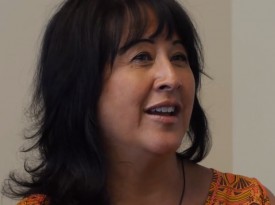 I sat down with Liza to hear her perspective on why Fast ForWord works so well for children on the autism spectrum, even if the child is not yet verbal. Liza started by sharing a story about a young adult named Cory, whom she's known for many years, and who happened to also be at the center the day of the interviews!
I sat down with Liza to hear her perspective on why Fast ForWord works so well for children on the autism spectrum, even if the child is not yet verbal. Liza started by sharing a story about a young adult named Cory, whom she's known for many years, and who happened to also be at the center the day of the interviews!
What types of children do you work with here at your clinic?
Most of the kids who are on the program here are on the spectrum. Some are completely non-verbal and others are on the higher end of the spectrum. They can express to us that their brains feel like scrambled eggs. We help give them a good, solid foundation with Fast ForWord.
Tell me about your student, Cory.
Cory came to us right when we opened our original [speech and language] site. His mom is a fabulous special education teacher. I've known Cory since his mom was pregnant with him. After he was born, he was later diagnosed on the autism spectrum. He very quickly gained information from his mom because of her expertise, but there was that one piece missing. He has explained it to me that sometimes his brain felt like a scrambled egg. We had him start using Fast ForWord and the rest is history.
How long have you been working with Cory? What does he want to do next?
This young man has gone on to high school and graduated. He has done a very good job and is now coming back to volunteer at our center because he wants to give back. That is full circle for us. It’s been a 10-year journey with him. We have so many success stories like him! You and I could sit here literally for a week if we went through all of our files. We have stories, e-mails, and videos of before and after [Fast ForWord] with many of our students. Cory is an extraordinary young man who has a heart that wants to serve and he wants to go into special education himself and teach. That’s a success story.
What other success stories do you have?
We have several others. There's a child we work with named Izzy. For the first three weeks of the program, if you would have been here, it would have sounded like we were asking her to do manual labor instead of a program in a computer lab! It was that bad: the crying, avoidant behavior, and screaming. Then, one day, she sat and started doing Fast ForWord quietly. She was finally at a point where she was sitting down and wanting to come in and do the program.
It may not look like big steps according to standardized testing, but for the families, therapists and for those of us who know her really well, it was a huge leap forward in terms of her lengthening her time on task and sitting long enough to gain information, turning around when you say, “Goodbye, Izzy.” You're a hundred feet away down the hallway and she turns and she waves at you now. That’s huge.
At what point during Fast ForWord do you start seeing progress?
The third week. We call it the magical third week. If you can get a child in every day for an hour on the program, we see that everything begins to come together for the child.
How many of your students are on the spectrum?
We have 400 plus kids in the clinic here. I would say 350 of those kids are on the spectrum. They have processing issues, visual processing issues, and auditory processing issues. It all comes from the same area of the brain. Fast ForWord levels the field for us. It takes care of a multitude of issues so when that child gets back into therapy, the therapists say, “Wow. Why didn’t we do this two years ago?”
How do you get parents involved? What do they think of Fast ForWord?
It does take a while for parents to get on board. Our parents sit out in the waiting room and tell each other. “Well, why is your child here?” “My child is doing Fast ForWord.” That plants the seed for them.
How long have you been running Fast ForWord? What success do you hear from former students?
I have been with Fast ForWord for almost 20 years. I have these students that are now in their late 20s and 30s that come back still to visit and say, “Do you remember when I couldn’t talk?” We have those stories. “Do you remember when I couldn’t read?” “Yes, I do.” I think Cory is just one of many stories we have of kids that are now in the workforce. That’s progress when they can work independently.
Watch as Cory and Liza share the impact of Fast ForWord!

